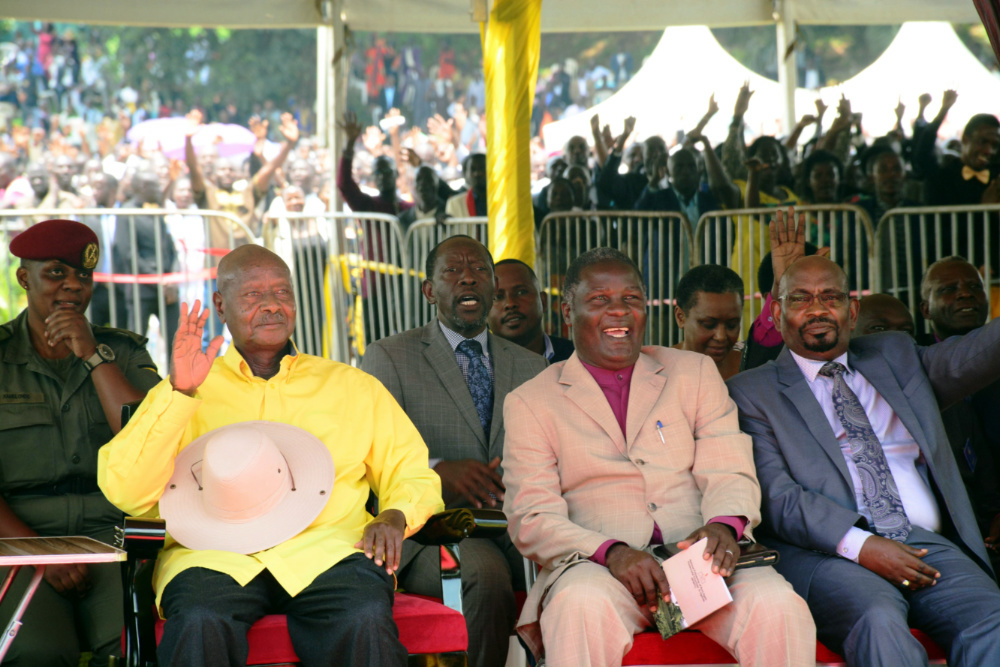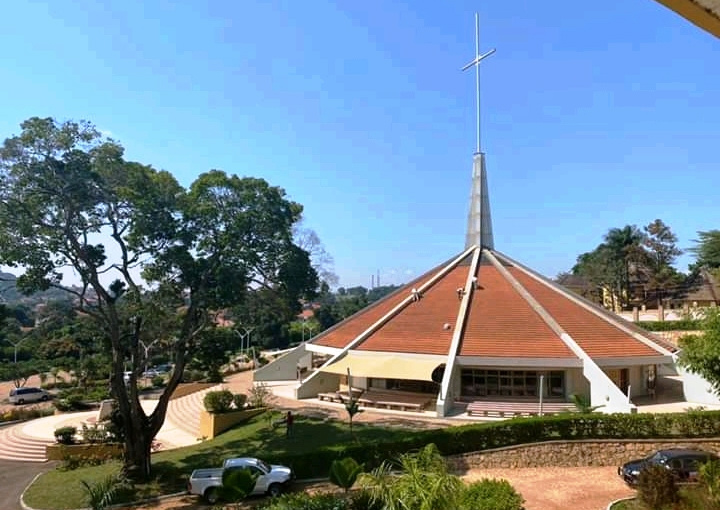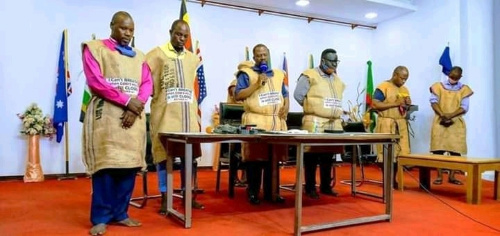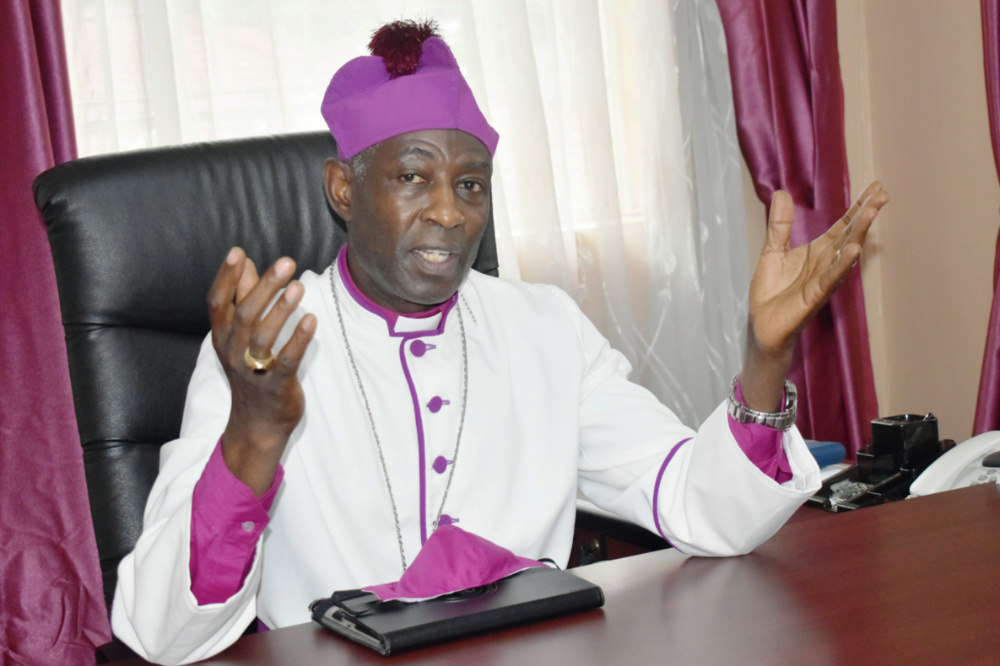
JOHN SEMAKULA reports from Uganda on the battle over church reopenings…
In his 1958 masterpiece, Things Fall Apart, Nigerian novelist Chinua Achebe had a character called Eneke the bird. When people wondered why Eneke was always flying without taking a rest, he answered: “Men have learned to shoot without missing their mark and I have learned to fly without perching on a twig.” In short, for Eneke to survive, he had to adapt to a new way of life.
Some politicians in Uganda seem to be adapting to a new way of life, in order not to perish. To control the rate of COVID-19 infections in Uganda, President Yoweri Museveni on 18th March announced a ban on mass gatherings in the country. School activities were subsequently suspended and congregating at worship centres for prayer banned. And that ban is still in force.

Uganda’s President Yoweri Museveni (in yellow) meeting pastors in the capital Kampala recently before the outbreak of the coronavirus pandemic. PICTURE: John Semakula.
Taking advantage of idle worship places, some politicians have used them to meet with campaign teams and hold political meetings. Not only has the holding of such political meetings in churches led to claims of descration of worship spaces; the act also goes against the country’s COVID-19 restrictions which prohibit political gatherings.
Henry Luke Orombi, Archbishop Emeritus of the Church of Uganda, tells Sight houses of worship are sacred and should never be used for political campaigns.
“Holding political meetings inside churches? This is a sign of lack of leadership in the church in those areas; political meetings should be held elsewhere, not in churches.”
– Henry Luke Orombi, Archbishop Emeritus of the Church of Uganda.
“Holding political meetings inside churches? This is a sign of lack of leadership in the church in those areas; political meetings should be held elsewhere, not in churches,” Orombi says.
It’s possible such meetings would not be occuring, if, as some religious leaders have been demanding, restrictions on meetings were eased. There’s no doubt, the continued closure of the houses of worship is causing tensions between the clergy and government.
During his last address to nation on issues related to COVID-19 on 21st July, President Museveni urged the clergy to work with the COVID-19 national taskforce in order to draft standard operating procedures, which can be used when the worship centres eventually get opened.
But the President’s decision not to lift the restrictions on houses of worship came as a big blow to the clergy and their flock. Museveni noted that if the houses of worship were reopened, they would easily become centres for spreading COVID-19.
Clergy have argued that general markets, shopping malls, arcades and public transport – whose operations had been eased – are busier sites than the houses of worship and that authorities would find it harder to implement the standard operating procedures in such places.
Responding to the President’s decision, the Rt Rev Stephen Kaziimba Mugalu, Archbishop of the Church of Uganda, says that keeping houses of worship closed when arcades and shopping malls are reopened was difficult to comprehend.
“We are more organised than the traders in the arcades,” Kaziimba tells Sight, adding: “if we ask the flock to sit and stand, they do, which no politician can do; and, we have divine authority.”
The Mufti of Uganda, Sheikh Ramadhan Mubajje, has also called for the re-opening of houses of worship, arguing that people need to congregate to pray for Uganda to overcome the COVID-19 pandemic.

Uganda Martyrs Basilica in Namugongo, Wakiso district undergoing renovations during the COVID-19 lockdown. The management of the Basilica has appealed to Ugandans to contribute to its refurbishment, arguing that due to COVID-19, they are unable to raise enough revenue from the Parishioners to give it a facelift. PICTURE: Supplied.
Despite the ongoing closures, just like Eneke the bird that had to adapt in order to survive, churches have innovated ways of keeping afloat and staying in touch with their congregants.
Prayers are now conducted using online platforms and electronic media, especially in urban centres, where people have access to the internet, radio and TV.
In rural areas, many clergy have resorted to using community audio towers, also known as CATS or horn speakers, to reach out to their flock during the lockdown.
But clergy have argued that despite the innovations, they are not as effective as holding prayers inside a worship centre.

Pastors protest by wearing sackcloth.
David Kiganda, the president of the Pastors Platform and the lead pastor at Christianity Focus Centre Ministries in Kampala, notes that while the flock is attentive during the prayers held inside houses of worship, that’s not the case when the prayers are relayed on the media. He also argues that those who do not have access to the Internet, radio or TV are automatically left out and that when services are relayed using the media, the flock is forced to listen and watch only those preachers who are being aired who may not necessarily be their choice.
To express their dissatisfaction about the continued closure of the houses of worship, a group of born-again pastors recently protested by wearing sackcloth. The sackcloth, which the pastors wore, bore an inscription saying: “I can’t breathe when God’s house is still closed.”
Kiganda, who led the campaign, tells Sight their protest is a symbol of mourning and repentance, according to the Bible, and that they won’t relent until houses of worship are reopened.
Kiganda argues that keeping the houses of worship closed is a sign that the nation does not put trust in God, yet says God has protected Uganda from registering huge numbers of coronavirus deaths. Figures from Johns Hopkins University’s Coronavirus Resource Center show Uganda has registered seven deaths related to COVID-19 with almost 1,300 cases.

The Archbishop of the Church of Uganda, Stephen Kaziimba Mugalu. PICTUE: Supplied
However, not all religious leaders are reading from the same script as Kiganda. Archbishop Kaziimba tells the Sight Anglicans would not participate in the protest because they prefer dialogue with government which they think is more effective.
Archbishop Emeritus Orombi, meanwhile, calls for calm, reasoning that God knows the needs of Christians and knows how they will survive through COVID-19 pandemic.
Pastor Solomon Male, the executive director of Arising for Christ, a Christian organisation whose leadership aims to restore the sanctity of Christ and rid the church of fake and corrupt pastors, tells Sight he also does not support the protest, noting that buildings are not the real church.
“Members of the early church used to converge at their homes to worship the Lord,” he says. “So, the perception that the church was closed because the flock can’t converge in the houses of worship is wrong.”
Male also mentions what many people have been saying in hushed tones, arguing that the clergy pushing government to reopen the houses of worship are those who use the houses of worship to con the flock of their money to accumulate personal wealth.
But Kiganda does not agree with Male, saying his argument is for pagans. He said it is only a pagan who would think that fellowshipping in houses of worship and the flock making financial contributions during a service is wrong.
“Those [pagans] abandoned God long ago. Ask them how much they have ever contributed to the church before,” Kiganda says. “Thinking that pastors use the flock to make money is an insult to us because it means we can’t do genuine business elsewhere.”
Many Ugandans believe that some pastors exploit their flock to accumulate personal wealth. It is also worth noting that before the restrictions were imposed on houses of worship in Uganda, President Museveni had accused clergy of interfering in politics and warned them against practices.
While worship centres in Uganda are still under lock and key, neighbours Rwanda and Kenya recently eased the operations of theirs, albeit with strict operating procedures, emphasising social distancing.
For now, whether the new innovations the churches in Uganda have made will bring a permanent new normal to their operations is something only time will tell, just like if Eneke the bird, will be in position to fly forever, without perching.





